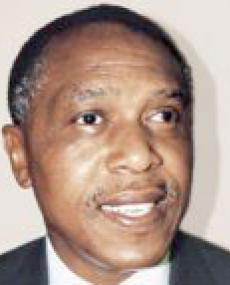
Tokyo Sexwale was born in Orlando West, Johannesburg as the third of six children of Godlieve and Frank Sexwale. He grew up amid the turmoil of the Black township's political upheaval. Sexwale attended St Martins Primary School in Rosettenville, Johannesburg and matriculated at Orlando West High School in 1972. His nickname “Tokyo" was derived from his involvement with the sport of karate in his youth. He attended the University of Botswana, Lesotho and Swaziland, first at its Lesotho campus and thereafter in Swaziland.
Sexwale became interested in politics at an early age. While at high school he became involved with theAfrican National Congress (ANC) through contact with other students. During the late 1960s and 1970s he was a staunch Black Consciousness supporter and a member and leader of the South African Students’ Movement (SASM).
Sexwale completed a diploma in business studies and registered for a BCom, but had to leave Swaziland when his ANC activities were detected by the Swazi authorities and attempts were made to arrest him in 1975. He left Swaziland for the Soviet Union, where he underwent political and military training in Moscow. In Simfiropool, near the Black Sea, he completed studies in conventional warfare and did an officer’s course.
The ANC then ordered Sexwale to join a group already acting within South Africa. He narrowly escaped arrest while crossing the border with a group of colleagues. They were being transported in a police van but were still carrying their weaponry and pamphlets, one member of the group threw a hand grenade through the window of the vehicle. In the confusion the ANC captives all jumped off the vehicle to safety. The explosion wrecked the Landrover (police vehicle). The group retreated to Swaziland and later returned to South Africa where their underground work involved political and military training of cell members. Sexwale and others were arrested in 1977 and tried in what later became known as the Pretoria Twelve Trial. He was convicted in 1978 and sentenced to eighteen years imprisonment.
While he was jailed on Robben Island, he served on the prisoners’ recreation committee and enrolled to complete his BCom. His study privileges were withdrawn on four occasions, he still had four courses left to complete his degree at the time of his release on 9 June 1990. He was released under the terms of the Groote Schuur Agreement between the National Party government and the African National Congress. He had spent thirteen years in prison.
Sexwale was elected to the ANC’s executive committee in the PWV area (now Gauteng) in September 1990 and served as head of the public liaison department of the African National Congress Headquarters. He was also appointed head of the special projects department of the ANC, dealing with matters like, inter alia,Umkhonto we Sizwe. In September 1991 he was elected chair of the ANC’s PWV region, as a result of him being an ex-officio member of the organisation’s national executive committee. Sexwale was appointed as premier of Gauteng Province from 1994 to January 1998, when he decided to leave politics. During his term of office he successfully facilitated hostel-related conflict situations.
Sexwale has not made himself available for any further elected ANC positions since 1998, choosing rather to run his own mining business. He is executive chair of Mvelaphanda Holdings (diamonds, platinum, energy) and Global Village Network. Sexwale also chairs Global village Network Technology, MOCOH Energy and Arcus Gibb Engineering. He is director or patron of several other companies and institutions and chancellor of the Vaal Triangle Technikon. As an entrepreneur he is successfully furthering Black Economic Empowerment throughout Africa and abroad.
He is known as a philanthropist and is a trustee of the Nelson Mandela Foundation and a patron of societies such as the Johannesburg Child and Family Welfare Society, Streetwise South Africa (an organisation dedicated to assisting street children), Save the Family Fund (catering for families and communities ravaged by apartheid violence) and The Sky is No Limit (which aims to expose disadvantaged youths to hi-tech education in computers and aviation). He is a member of the organising committee for the 2010 FIFA World Cup, to be held in South Africa.
Sexwale is the author of a number of political and economic articles and poetry. He has received the following awards: French Legion d’Honneur, Cross for Vaour (Ruby class), Paul Harris Fellow of Rotary Foundation, Order of Freedom Havana in Cuba and DTech (hc) from University Nottingham. Sexwale is Finland's honorary consul-general in South Africa and a Finnish flag flies outside his Houghton home.
He married Judy van Vuuren, a paralegal who worked for a Cape Town law firm and who he had met while in prison, shortly after his release. They have two children, Gabrielle and Chris and live in Boksburg. He has two children from a previous marriage.